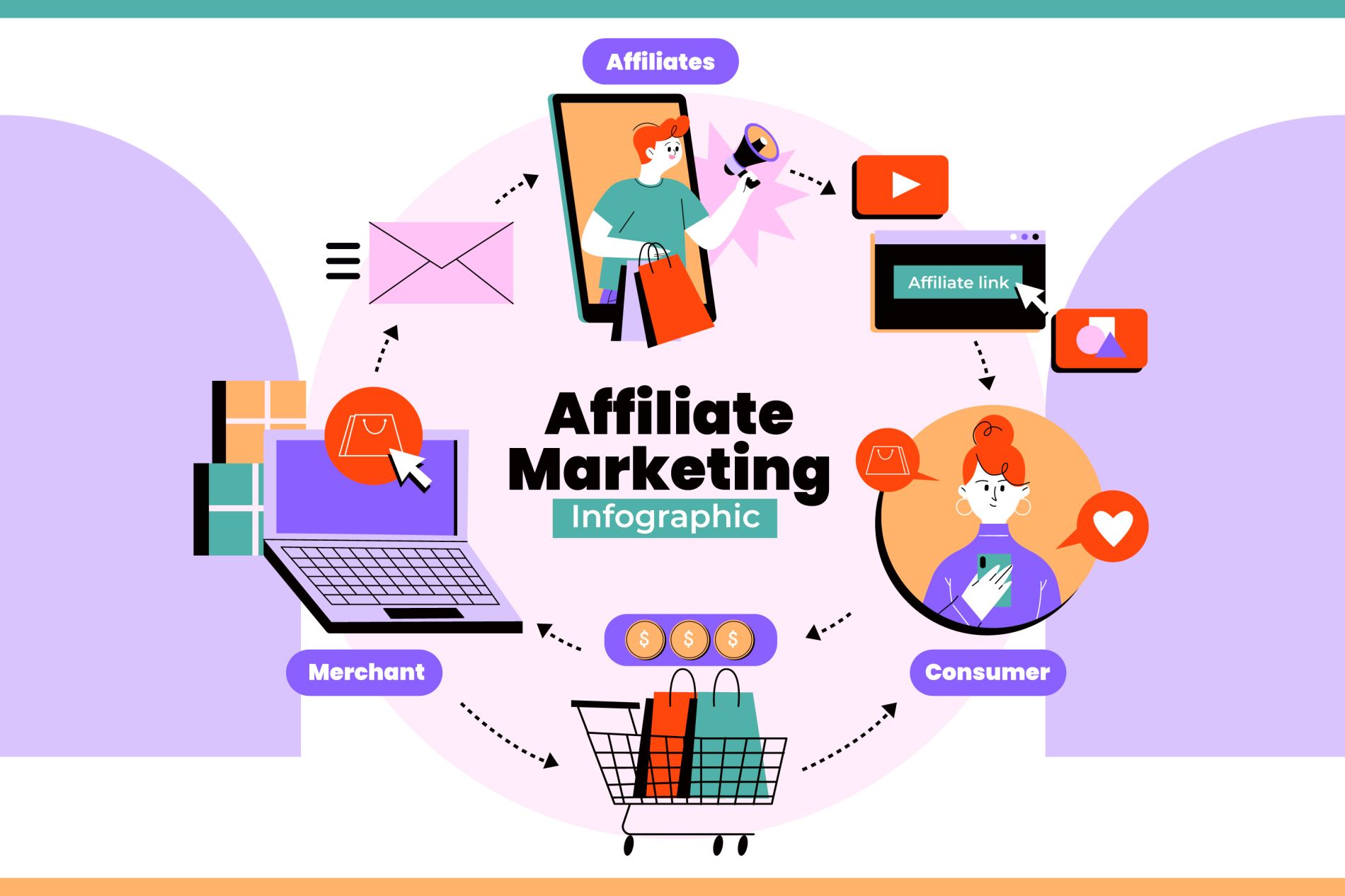Nội dung bài viết:
Affiliate Marketing là gì?
Các thành phần
Các hình thức phổ biến
Lợi ích đối với doanh nghiệp
Affiliate Marketing (Tiếp thị liên kết) đang dần trở thành chiến lược marketing "bắt buộc" cho các doanh nghiệp trong thời đại công nghệ số. Mô hình này không chỉ giúp doanh nghiệp tăng doanh thu, tiết kiệm chi phí mà còn mở rộng thương hiệu hiệu quả. Vậy Affiliate Marketing là gì và mang lại lợi ích gì cho doanh nghiệp? Hãy cùng TRÒN khám phá trong bài viết này nhé!
Affiliate Marketing là gì?
Affiliate Marketing (hay Tiếp thị liên kết) là hình thức hợp tác giữa doanh nghiệp và các cá nhân/tổ chức (được gọi là Affiliate) để quảng bá sản phẩm/dịch vụ. Affiliate sẽ nhận hoa hồng dựa trên hiệu quả chiến dịch, thường là số lượng khách hàng tiềm năng hoặc doanh số bán hàng được tạo ra từ kênh của họ.
Các thành phần của Affiliate Marketing
- Doanh nghiệp (Advertiser/Merchant): Bên cung cấp sản phẩm/dịch vụ và chịu trách nhiệm trả hoa hồng cho Affiliate.
- Nhà tiếp thị liên kết (Affiliate/Publisher): Bên quảng bá sản phẩm/dịch vụ của doanh nghiệp và nhận hoa hồng khi tạo ra hiệu quả (có thể là blogger, influencer, website so sánh,...)
- Khách hàng (End User): Người mua sản phẩm/dịch vụ thông qua liên kết của Affiliate.
- Nền tảng Affiliate (Affiliate Network): Nơi kết nối doanh nghiệp và Affiliate, cung cấp công cụ quản lý chiến dịch và theo dõi hiệu quả (ví dụ: Accesstrade, VLINK, …).
 |
Các hình thức phổ biến của Affiliate Marketing
1. Pay-per-click (PPC):
Affiliate nhận hoa hồng khi có người click vào liên kết quảng bá của họ. Ví dụ: Một blogger đặt banner quảng cáo của sản phẩm trên blog của mình. Khi người đọc click vào banner và truy cập vào website của sản phẩm, blogger sẽ nhận được hoa hồng.
2. Pay-per-lead (PPL):
Affiliate nhận hoa hồng khi có người điền thông tin liên hệ hoặc đăng ký nhận bản tin qua liên kết quảng bá của họ (như điền form, tải xuống ebook, …). Ví dụ: Một influencer đăng video review sản phẩm mới của doanh nghiệp trên TikTok. Khi người xem click vào liên kết trong video và điền form đăng ký nhận thông tin về sản phẩm, influencer sẽ nhận được hoa hồng.
3. Pay-per-sale (PPS):
Affiliate nhận hoa hồng khi có người mua sản phẩm hoặc dịch vụ qua liên kết quảng bá của họ. Ví dụ: Một website so sánh giá so sánh giá của các sản phẩm điện thoại khác nhau. Khi người dùng click vào liên kết từ website và mua điện thoại từ Tiki, website so sánh giá sẽ nhận được hoa hồng.
4. Pay-per-install (PPI):
Affiliate nhận hoa hồng khi có người cài đặt ứng dụng di động thông qua liên kết quảng bá của họ. Ví dụ: Một influencer đăng bài viết giới thiệu ứng dụng mới của Grab trên Instagram. Khi người xem click vào liên kết trong bài viết và cài đặt ứng dụng Grab, influencer sẽ nhận được hoa hồng.
Ngoài ra, còn có một số hình thức affiliate marketing khác như:
- Pay-per-action (PPA): Affiliate nhận hoa hồng khi người dùng thực hiện một hành động cụ thể (như xem video, tham gia khảo sát, …).
- Revenue sharing: Affiliate nhận một phần doanh thu từ sản phẩm hoặc dịch vụ được bán thông qua liên kết quảng bá của họ.
Doanh nghiệp cần lựa chọn hình thức affiliate marketing phù hợp với mục tiêu marketing và sản phẩm hoặc dịch vụ của mình.
Ví dụ:
- Nếu doanh nghiệp muốn tăng nhận thức về thương hiệu, có thể sử dụng hình thức PPC.
- Nếu doanh nghiệp muốn thu hút khách hàng tiềm năng, có thể sử dụng hình thức PPL.
- Nếu doanh nghiệp muốn tăng doanh số bán hàng, có thể sử dụng hình thức PPS.
 |
Lợi ích của affiliate marketing đối với doanh nghiệp
1. Tăng cường nhận thức về thương hiệu:
- Affiliate marketing giúp doanh nghiệp tiếp cận với nhiều khách hàng tiềm năng hơn thông qua mạng lưới các affiliate marketer.
- Khi khách hàng nhìn thấy sản phẩm hoặc dịch vụ của doanh nghiệp được giới thiệu bởi nhiều người nổi tiếng và cả người thường, họ sẽ có thiện cảm và tin tưởng hơn vào thương hiệu.
2. Mở rộng thị trường mục tiêu:
- Affiliate marketing giúp doanh nghiệp tiếp cận được với những khách hàng mà họ chưa thể tiếp cận thông qua các kênh marketing truyền thống.
- Các affiliate marketer có thể nhắm mục tiêu đến các đối tượng cụ thể dựa trên sở thích, hành vi và nhân khẩu học.
- Ví dụ: Một công ty bán mỹ phẩm có thể hợp tác với các blogger làm đẹp để quảng bá sản phẩm của họ. Điều này giúp công ty tiếp cận được với những khách hàng tiềm năng quan tâm đến mỹ phẩm.
3. Cải thiện tỷ lệ chuyển đổi:
- Affiliate marketing giúp doanh nghiệp thu hút những khách hàng tiềm năng thực sự quan tâm đến sản phẩm hoặc dịch vụ của họ.
- Các affiliate marketer thường chỉ quảng bá những sản phẩm hoặc dịch vụ mà họ tin tưởng và sử dụng.
- Ví dụ: Một công ty du lịch có thể hợp tác với các travel blogger để quảng bá các tour du lịch của họ. Điều này giúp công ty thu hút được những khách hàng tiềm năng thực sự muốn đi du lịch.
4. Tiết kiệm chi phí:
- Affiliate marketing là một hình thức marketing hiệu quả với chi phí thấp.
- Doanh nghiệp chỉ cần trả hoa hồng cho affiliate marketer khi họ mang lại doanh số bán hàng thực tế.
- Ví dụ: Một công ty bán đồ điện tử có thể hợp tác với các influencer trên mạng xã hội để quảng bá sản phẩm của họ. Doanh nghiệp chỉ cần trả hoa hồng cho influencer khi họ bán được sản phẩm.
5. Đo lường hiệu quả:
- Affiliate marketing giúp doanh nghiệp dễ dàng theo dõi và đo lường hiệu quả của chiến dịch marketing thông qua các công cụ phân tích dữ liệu.
- Doanh nghiệp có thể theo dõi số lượng click, lượt truy cập, tỷ lệ chuyển đổi và doanh số bán hàng để đánh giá hiệu quả của chiến dịch.
- Ví dụ: Một công ty bán quần áo có thể sử dụng Google Analytics để theo dõi hiệu quả của chiến dịch affiliate marketing. Doanh nghiệp có thể theo dõi số lượng click vào đường dẫn giới thiệu của affiliate marketer, số lượng khách hàng truy cập vào website của doanh nghiệp và số lượng đơn hàng được đặt hàng.
Affiliate marketing là một chiến lược marketing hiệu quả mang lại nhiều lợi ích cho doanh nghiệp. Với khả năng tiếp cận khách hàng tiềm năng, tăng doanh số bán hàng và tối ưu hóa chi phí, affiliate marketing là một công cụ đắc lực cho doanh nghiệp trong thời đại công nghệ số.
 |
Xem thêm:
TỐI ƯU HÓA TỶ LỆ CHUYỂN ĐỔI (CRO) LÀ GÌ? LÀM THẾ NÀO ĐỂ BẮT ĐẦU?
TẤT TẦN TẬT VỀ UGC 2024: BÍ QUYẾT BIẾN KHÁCH HÀNG THÀNH "CONTENT CREATOR" CỦA THƯƠNG HIỆU
XU HƯỚNG UGC CẦN CHÚ Ý TRONG NĂM 2024: TẬN DỤNG SỨC MẠNH SÁNG TẠO CỦA CỘNG ĐỒNG
-----
[ENGLISH BELOW]
Article Content:
What is Affiliate Marketing?
Components
Common Types
Benefits for Businesses
Affiliate Marketing is gradually becoming a "must-have" marketing strategy for businesses in the digital age. This model not only helps businesses increase revenue and save costs but also effectively expands their brand. So what is Affiliate Marketing, and what benefits does it bring to businesses? Let's explore with TRÒN in this article!
What is Affiliate Marketing?
Affiliate Marketing is a form of collaboration between businesses and individuals/organizations (referred to as Affiliates) to promote products/services. Affiliates earn commissions based on the campaign's performance, often measured by the number of potential customers or sales generated from their channels.
Components of Affiliate Marketing
-
Business (Advertiser/Merchant): The entity providing products/services and responsible for paying commissions to the Affiliate.
-
Affiliate (Affiliate/Publisher): The entity promoting the business's products/services and earning commissions when they achieve results (could be bloggers, influencers, comparison websites, etc.).
-
Customer (End User): The person who purchases the product/service through the Affiliate's link.
-
Affiliate Network: The platform that connects businesses and Affiliates, providing campaign management and performance tracking tools (e.g., Accesstrade, VLINK, etc.).
 |
Common Types of Affiliate Marketing
1. Pay-per-click (PPC):
Affiliates earn commissions when someone clicks on their promotional link. For example, a blogger places a product advertisement banner on their blog. When readers click on the banner and visit the product's website, the blogger receives a commission.
2. Pay-per-lead (PPL):
Affiliates earn commissions when someone fills out contact information or subscribes to a newsletter through their promotional link (e.g., filling out a form, downloading an ebook, etc.). For example, an influencer posts a review video of a new product from a company on TikTok. When viewers click on the link in the video and fill out a registration form for information about the product, the influencer earns a commission.
3. Pay-per-sale (PPS):
Affiliates earn commissions when someone purchases a product or service through their promotional link. For example, a price comparison website compares the prices of various phones. When users click on the link from the website and buy a phone from Tiki, the price comparison website receives a commission.
4. Pay-per-install (PPI):
Affiliates earn commissions when someone installs a mobile application through their promotional link. For example, an influencer posts about a new Grab app on Instagram. When viewers click on the link in the post and install the Grab app, the influencer receives a commission.
Additionally, there are other forms of affiliate marketing, such as:
- Pay-per-action (PPA): Affiliates earn commissions when users perform a specific action (such as watching a video, participating in a survey, etc.).
- Revenue Sharing: Affiliates receive a portion of the revenue from the product or service sold through their promotional link.
Businesses need to choose the appropriate form of affiliate marketing that aligns with their marketing goals and product or service.
Examples:
- If a business wants to increase brand awareness, they can use the PPC model.
- If a business wants to attract potential customers, they can use the PPL model.
- If a business wants to increase sales, they can use the PPS model.
 |
Benefits of Affiliate Marketing for Businesses
1. Enhance Brand Awareness:
- Affiliate marketing helps businesses reach more potential customers through a network of affiliate marketers.
- When customers see a company's product or service being endorsed by both celebrities and ordinary people, they are more likely to have a positive impression and trust the brand.
2. Expand Target Market:
- Affiliate marketing enables businesses to reach customers they might not have been able to reach through traditional marketing channels.
- Affiliate marketers can target specific audiences based on preferences, behaviors, and demographics.
- For example, a cosmetics company can collaborate with beauty bloggers to promote their products. This helps the company reach potential customers who are interested in cosmetics.
3. Improve Conversion Rates:
- Affiliate marketing helps businesses attract potential customers who are genuinely interested in their products or services.
- Affiliate marketers often only promote products or services they trust and use themselves.
- For example, a travel company can collaborate with travel bloggers to promote their tours. This helps the company attract potential customers who genuinely want to travel.
4. Cost Savings:
- Affiliate marketing is an effective form of marketing with low costs.
- Businesses only need to pay commissions to affiliate marketers when they generate actual sales.
- For example, an electronics company can partner with social media influencers to promote their products. The business only needs to pay a commission to the influencer when a product is sold.
5. Measure Effectiveness:
- Affiliate marketing allows businesses to easily track and measure the effectiveness of their marketing campaigns through data analytics tools.
- Companies can track the number of clicks, visits, conversion rates, and sales to evaluate the effectiveness of their campaigns.
- For example, a clothing company can use Google Analytics to track the effectiveness of their affiliate marketing campaign. They can monitor the number of clicks on affiliate marketers' referral links, the number of customers visiting the company's website, and the number of orders placed.
Affiliate marketing is an effective marketing strategy that offers numerous benefits to businesses. With its ability to reach potential customers, increase sales, and optimize costs, affiliate marketing is a powerful tool for businesses in the digital age.
 |
See more:
WHAT IS CONVERSION RATE OPTIMIZATION (CRO)? HOW TO GET STARTED?
EVERYTHING ABOUT UGC 2024: THE SECRET TO TURNING CUSTOMERS INTO BRAND "CONTENT CREATORS"
UGC TRENDS TO WATCH IN 2024: LEVERAGING THE CREATIVE POWER OF THE COMMUNITY
TRÒN HOUSE
